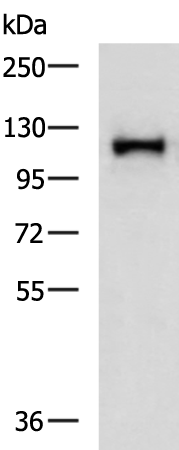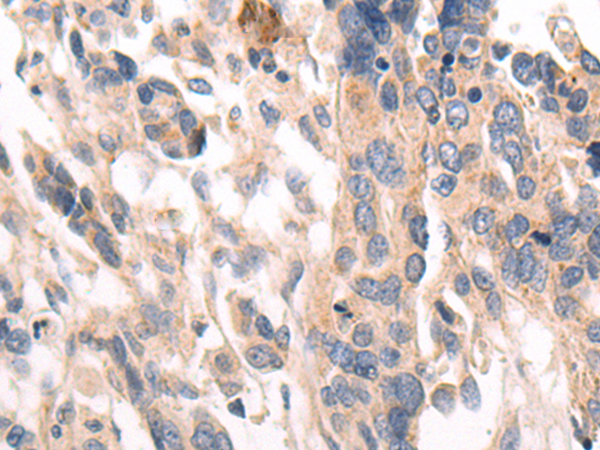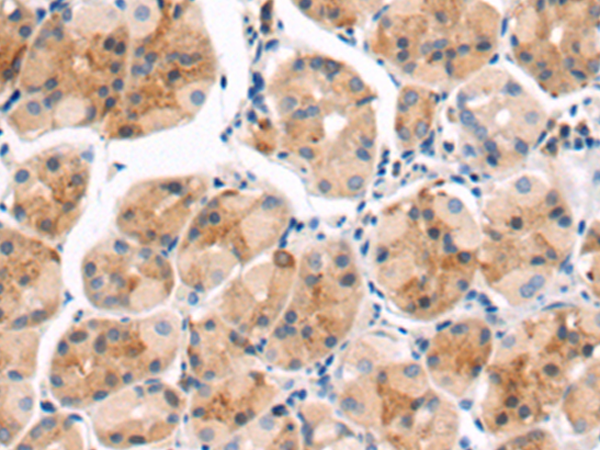


| WB | 咨询技术 | Human,Mouse,Rat |
| IF | 咨询技术 | Human,Mouse,Rat |
| IHC | 1/100-1/300 | Human,Mouse,Rat |
| ICC | 技术咨询 | Human,Mouse,Rat |
| FCM | 咨询技术 | Human,Mouse,Rat |
| Elisa | 1/5000-1/10000 | Human,Mouse,Rat |
| Aliases | AFAP; AFAP110; AFAP-110 |
| WB Predicted band size | 81 kDa |
| Host/Isotype | Rabbit IgG |
| Antibody Type | Primary antibody |
| Storage | Store at 4°C short term. Aliquot and store at -20°C long term. Avoid freeze/thaw cycles. |
| Species Reactivity | Human, Mouse, Rat |
| Immunogen | Fusion protein of human AFAP1 |
| Formulation | Purified antibody in PBS with 0.05% sodium azide and 50% glycerol. |
+ +
以下是3-4篇与AFAP1抗体相关的文献摘要信息,按规范格式整理:
---
1. **文献名称**: *AFAP1 is a novel downstream effector of v-Src in transformation*
**作者**: Qian, X., Li, G., & Asmussen, H.K. et al.
**摘要**: 该研究利用AFAP1特异性抗体,通过免疫共沉淀和免疫荧光技术,揭示了AFAP1在v-Src介导的细胞转化中的作用,证明其通过调节细胞骨架重组促进肿瘤侵袭。
2. **文献名称**: *AFAP1-AS1. a long noncoding RNA, promotes hepatocellular carcinoma progression through regulation of AFAP1 expression*
**作者**: Zhang, H., Yang, K., & Ren, T.
**摘要**: 通过Western blot和免疫组化(使用AFAP1抗体),发现AFAP1-AS1 lncRNA通过上调AFAP1表达激活RhoA/ROCK通路,促进肝癌细胞迁移和转移。
3. **文献名称**: *Prognostic significance of AFAP1 overexpression in pancreatic ductal adenocarcinoma*
**作者**: Li, J., Liu, Y., & Wang, Z.
**摘要**: 利用AFAP1抗体对胰腺癌组织进行染色,发现AFAP1高表达与患者生存率负相关,提示其可作为胰腺癌预后生物标志物。
4. **文献名称**: *AFAP1 interacts with KRAS to modulate stress fiber formation and cell migration*
**作者**: Flynn, C.R., & Bais, M.V.
**摘要**: 研究通过抗体介导的蛋白质互作分析,证实AFAP1与KRAS结合调控细胞应力纤维形成,影响结直肠癌细胞的迁移能力。
---
以上文献均涉及AFAP1抗体在肿瘤机制或诊断中的应用,涵盖分子机制、预后评估及信号通路研究。如需具体DOI或年份,可进一步补充关键词检索。
The AFAP1 (Actin Filament-Associated Protein 1) antibody is a research tool targeting AFAP1. a scaffolding protein involved in cytoskeletal organization and cellular signaling. AFAP1 interacts with actin filaments and signaling molecules like Src kinases, playing roles in cell adhesion, migration, and invasion. Its dysregulation is linked to cancer progression, particularly in tumors with enhanced metastatic potential, such as breast, lung, and pancreatic cancers.
AFAP1 antibodies are widely used in studies to detect AFAP1 expression and localization via techniques like Western blotting, immunohistochemistry, and immunofluorescence. These antibodies help elucidate AFAP1's molecular mechanisms in tumorigenesis, including its role in modulating invadopodia formation, extracellular matrix degradation, and epithelial-mesenchymal transition (EMT).
Recent research highlights AFAP1's involvement in crosstalk between cytoskeletal dynamics and oncogenic signaling pathways, such as FAK/Src and PI3K/AKT. Commercially available AFAP1 antibodies are typically validated for specificity across human and murine samples, aiding translational studies. However, variability in antibody performance (e.g., cross-reactivity) necessitates careful validation for experimental conditions. Overall, AFAP1 antibodies are critical for advancing understanding of cancer biology and potential therapeutic targeting of metastasis-related pathways.
×